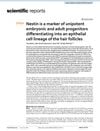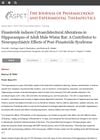 December 2023 in “bioRxiv (Cold Spring Harbor Laboratory)”
December 2023 in “bioRxiv (Cold Spring Harbor Laboratory)” Aged individuals heal wounds less effectively due to specific immune cell issues.

Stem cells regenerate tissues and their behavior varies by environment, suggesting the hematopoietic system model may need revision.
 130 citations,
November 2017 in “Frontiers in Immunology”
130 citations,
November 2017 in “Frontiers in Immunology” The conclusion is that Treg-targeted therapies have potential, but more knowledge of Treg biology is needed for effective treatments, including for cancer.
 3 citations,
July 2011 in “Folia Histochemica et Cytobiologica”
3 citations,
July 2011 in “Folia Histochemica et Cytobiologica” Calcium reduces involucrin in rat hair bulbs but doesn't affect filaggrin and Kdap.
 44 citations,
April 2017 in “Genes & development”
44 citations,
April 2017 in “Genes & development” Scientists found cells in hair that are key for growth and color.
 22 citations,
October 2020 in “Anais Brasileiros de Dermatologia”
22 citations,
October 2020 in “Anais Brasileiros de Dermatologia” The Brazilian Society of Dermatology agrees that oral isotretinoin is effective for acne and other skin conditions, and it's safe when monitored, but more research is needed on dosing and duration.
 6 citations,
April 2017 in “Frontiers in Pharmacology”
6 citations,
April 2017 in “Frontiers in Pharmacology” Chinese medicine may help treat hair loss by affecting genes and enzyme activity.
 October 2023 in “Clinical, Cosmetic and Investigational Dermatology”
October 2023 in “Clinical, Cosmetic and Investigational Dermatology” Supplemented Erzhi Wan may help regrow hair in male pattern baldness by affecting certain cell signaling pathways.
 September 2024 in “Stem Cell Research & Therapy”
September 2024 in “Stem Cell Research & Therapy” HA-stimulated stem cell vesicles improved hair growth in male mice with androgenetic alopecia.
 6 citations,
July 2022 in “World journal of stem cells”
6 citations,
July 2022 in “World journal of stem cells” Using extracellular vesicles from stem cells can help hair grow by affecting scalp cells and hair follicles.
 4 citations,
September 2020 in “PeerJ”
4 citations,
September 2020 in “PeerJ” Platelet factor 4 slows down hair growth and could make hair loss treatments more effective if removed.
67 citations,
June 2019 in “Proceedings of the National Academy of Sciences” A new 3D culture system helps grow and study mouse skin stem cells for a long time.
1 citations,
May 2022 in “International journal of molecular sciences” Faulty LEF1 activation causes faster skin cell differentiation in premature aging syndrome.
 7 citations,
January 2022 in “Scientific Reports”
7 citations,
January 2022 in “Scientific Reports” Acanthus ebracteatus Vahl. extract and verbascoside may help prevent hair loss and promote hair growth due to their anti-inflammatory properties and ability to protect against cell death.
 6 citations,
May 2014 in “Biomarkers and Genomic Medicine”
6 citations,
May 2014 in “Biomarkers and Genomic Medicine” Charnoly bodies could be a marker for cell damage, and certain nutrients and proteins might prevent them, potentially helping with brain diseases and cancer.
 26 citations,
February 1998 in “Chemico-Biological Interactions”
26 citations,
February 1998 in “Chemico-Biological Interactions” Scientists identified three genes important for processing certain brain chemicals, thyroid hormones, and medications.
 3 citations,
August 2016 in “Behavioural Brain Research”
3 citations,
August 2016 in “Behavioural Brain Research” Finasteride given to baby rats reduces dopamine release and increases alcohol consumption in adult males.
 1 citations,
October 2022 in “Scientific reports”
1 citations,
October 2022 in “Scientific reports” Nestin identifies specific progenitor cells in hair follicles that can become outer root sheath cells.

Early NAS level changes affect alcohol consumption vulnerability.
 1 citations,
October 2022 in “Springer eBooks”
1 citations,
October 2022 in “Springer eBooks” Testosterone is key for male sexual function, and treating hormone imbalances can improve sexual issues.
 12 citations,
July 2021 in “Scientific Reports”
12 citations,
July 2021 in “Scientific Reports” Glutamic acid helps increase hair growth in mice.
24 citations,
March 2020 in “Cells” Natural small molecules can help treat diseases by activating or inhibiting the Wnt pathway.
61 citations,
April 2018 in “Frontiers in endocrinology” Sex steroids produced in the hippocampus are crucial for brain functions like memory and learning in rodents.
 14 citations,
March 2017 in “Brain research”
14 citations,
March 2017 in “Brain research” Progesterone and its byproducts control a specific receptor in the brain independently of progesterone receptors, affecting conditions related to the menstrual cycle.

Finasteride may cause memory problems by damaging the hippocampus.
33 citations,
December 2017 in “Journal of neuroendocrinology” Sex and stress steroids quickly change brain cell structures in the hippocampus.
 26 citations,
September 2012 in “Epilepsy & Behavior”
26 citations,
September 2012 in “Epilepsy & Behavior” Finasteride worsens seizures in epilepsy rats and speeds up epileptogenesis in mice.
April 2015 in “Faculty Opinions – Post-Publication Peer Review of the Biomedical Literature”  22 citations,
December 2010 in “Journal of Cosmetic Dermatology”
22 citations,
December 2010 in “Journal of Cosmetic Dermatology” Finasteride may increase depression by reducing brain cell growth.
12 citations,
February 2017 in “International journal of developmental neuroscience” Female guinea pigs exposed to less allopregnanolone before birth showed more anxiety-like behavior.























